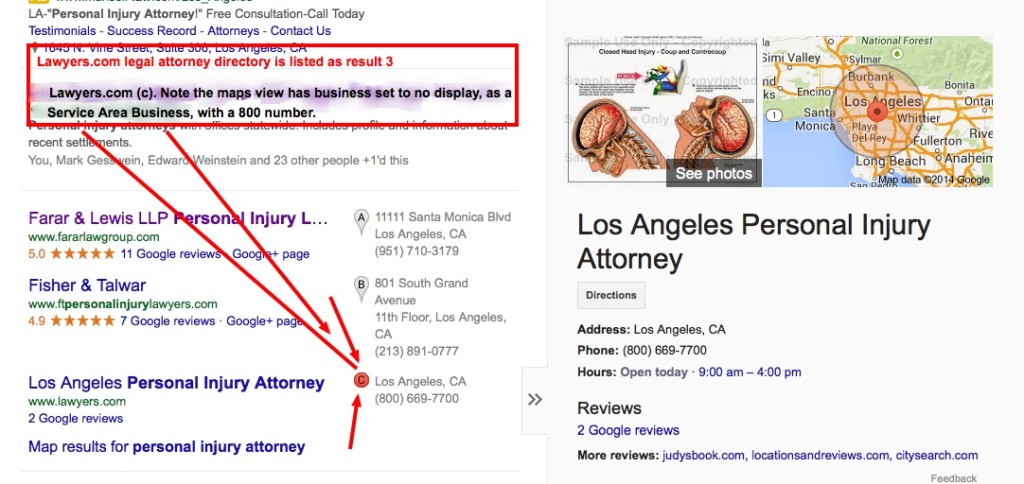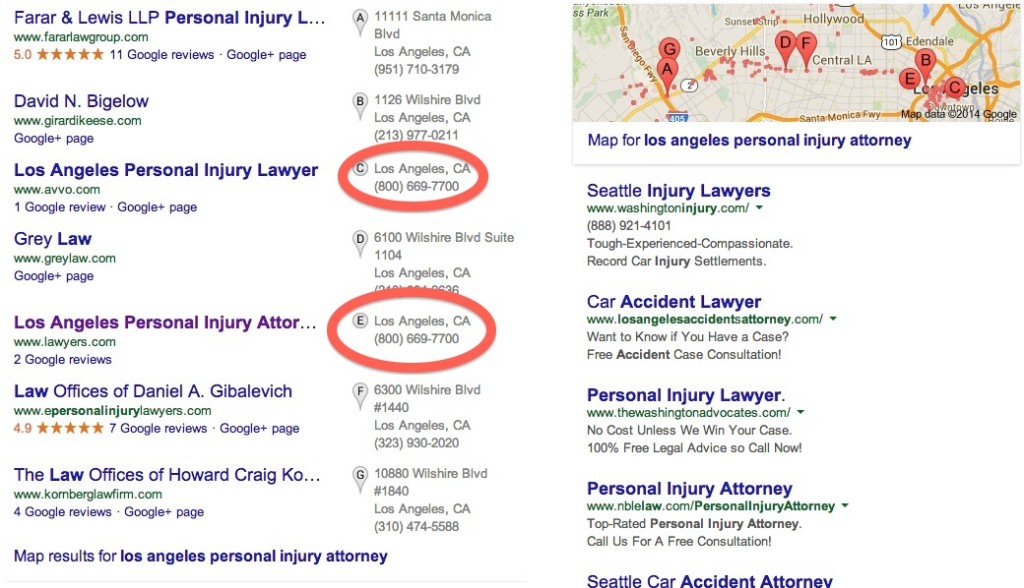Every year, I get an email from Moz asking for input into their Local Ranking Factors survey. The survey is conducted amongst a small group of SEO nerds. Due to the competitiveness of legal marketing, be glad to know our niche is especially well represented- I’m joined by legal marketing geeks, Mike Ramsey, Gyi Tsakalakis and Casey Meraz. This year, the study came out shortly after Google launched the snack pack (catch up here), so the results are particularly interesting.
If you want to geek out, you can read the full Moz study here.
Overall Ranking Factors
Ranking Factors continue to diversify – meaning there are a wide array of things you need to get right. Vendors who provide just one piece of the puzzle are rarely going to be enough to drive success (and yes – I fully acknowledge this is a self-serving comment.) The factor consistently gaining in significance is behavioral performance (i.e. click through rates, time on site etc.) – this has been backed up by numerous studies. In legal, this emphasizes issues like brand, meta descriptions, a site’s look and feel/user interface and accessibility of information.
And despite the ongoing assertions of social media pundits – Social is entirely immaterial to local performance – coming in dead last among all ranking categories. Joy Hawkins (who is our secret go-to person when we get utterly stuck on a complex Google My Business issues) explains social and search:
I gave social signals 1% for organic impact because I do think it’s possible that they could impact ranking – I have just never seen a single case where they did. I always quote Matt Cutts where he indicated that when it comes to social signals it’s a correlation and not causation. Businesses that are active on Facebook also usually care about their ranking on Google and are actively trying to improve it. One doesn’t cause the other.
David Mihm, the author of the survey, offers his take on the waning (if not entirely dead) impact of Google+ in ranking:
At this point, I view Google My Business essentially as a UI for structured data* and a conduit to AdWords. While Google’s original “business builder” vision may still come to fruition, it clearly won’t be under the social umbrella of Google+.
Top 10 Ranking Factors for Local (now Snack Pack)
- Physical Address in City of Search
- NAP Consistency in Structured Citations
- Proper Google My Business Categories
- Proximity of Address to the Point of Search (i.e. physically where is the searcher)
- Quality/Authority of Structured Citations
- Domain Authority of Website
- Product/Service Keyword in Google My Business Business Title
- City, State in Google My Business Landing Page Title
- HTML NAP matching Google My Business Location NAP
- Click Through Rate from Search Results
Of particular note is the focus on quality including the prevalence of accuracy in Google My Business information (note David’s comment above).
Ranking Differentiators for Competitive Markets (i.e. legal)
My favorite facet of the survey is the focus on competitive markets – essentially almost all of the legal marketing space. After getting the fundamentals right, this becomes the tactical focus of our engagements and frankly, these are often the hardest components of search – the stuff that can’t be automated, simplified or easily copied.
- Consistency of Structured Citations
- Domain Authority of Website
- Quality/Authority of Inbound Links to Domain
- Quality/Authority of Structured Citations
- Proper Google My Business Category Associations
- Physical Address in City of Search (in the past month, we have been consulted twice on helping law firms decide what building to move in to.)
- Quantity of Native Google Reviews
- Quality/Authority of Inbound Links to Google My Business Landing Page URL
- CTR from search results pages
- Quality/Authority of Unstructured Citations (i.e. Newspaper articles)
Note the heavy heavy focus on quality above. You don’t achieve these tactics through $10 for 1,000 twitter followers or a paid citation campaign.
Non Local Local Results
Heh? This is really localized natural search – i.e. results for local queries (even those without a geo-modifier) that return typical SEO results. I don’t want dwell on this, as this is a post about Local (i.e. mapped) results, but for natural search with a local component (which represents at least 95% of legal searches – the focus is on providing accurate location signals through Google My Business and a heavy focus on site authority (i.e. high quality links). In fact the top 2 signals according to the survey are link related.
Negative Ranking Factors
Of course, no SEO conversation would be complete without a discussion of penalties.
- Incorrect business category
- Listing at false business address
- Mis-Match NAP or Tracking Phone Numbers
- Presence of malware
- Reports of Violations in your Google My Business location
- Mis-matched NAP/tracking phone numbers on Google My Business page
- Mis-matched Address on Google My Business page
- Multiple Google My Business locations with Same Phone Number
- Absence of NAP on website
- Address includes suite number similar to UPS Mail Store or other false address.
The negative ranking factors center around incorrect NAP as well and inconsistent information in…. here it is again…. Google My Business. Given the prevalence of geo spam among lawyers (i.e. “virtual offices” or fake offices shoehorned into your friends insurance office), I expect we will continue to see a greater focus on reporting of non-real offices. Frankly, the only impact we saw among law firms with the Pigeon roll out was severe penalties on some significant local spammers; so none of this really surprises me.
Snack Pack
Acknowledging that the Snack Pack launched just prior to the survey (and so the following is probably more intuitive rather than based on any studies, Moz asked about change in tactical focus given the snack pack. Across the board, the increased focus was on quality signals (NAP, Authority, Citations). The only quantity factor was Google specific reviews (i.e. the more the better but note the focus on Google, NOT reviews across the web – Avvo, Yelp etc.). Tactical losers focused on quantity (which I read to mean low cost, low value, low authority – easily replicable) links, citations and…. my favorite punching bag…. social shares.



